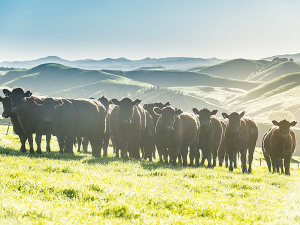Editorial: Happy days
OPINION: The year has started positively for New Zealand dairy farmers and things are likely to get better.
 The programme will lower the beef sector's greenhouse gas emissions by delivering gas emissions by delivering cows with a smaller environmental hoof-print.
The programme will lower the beef sector's greenhouse gas emissions by delivering gas emissions by delivering cows with a smaller environmental hoof-print.
Dairy farmers are set to benefit from a $17 million beef genetics programme backed by the red meat sector and the Government.
Beef+Lamb New Zealand (B+LNZ) is providing $10m towards the seven-year project Informing New Zealand Beef, the Ministry for Primary Industries will provide the balance.
The project is expected to result in more efficient cows within the next 25 years. The programme is targeting a 10% reduction in greenhouse gas emissions per kilogram of product produced.
Agriculture Minister Damien O'Connor says the programme will lower the beef sector's greenhouse gas emissions by delivering cows with a smaller environmental hoof-print.
"The cows most suited to New Zealand's production systems will be moderate in size, but still highly productive. Moderate sized cows which require less feed will help to lower the impact on soils and produce less methane," says O'Connor.
"To date we've relied on an Australian beef genetics framework, but the time is right to create our own programme tailored to New Zealand conditions."
B+LNZ chief executive Sam McIvor says the programme capitalises on New Zealand's world-leading skills and knowledge in sheep genetics and applies them to the beef industry.
"The data tells us that our beef industry has been lagging behind on genetic progress," he says.
"Not only will this give the industry better genetic tools, but a major focus of the programme is to work with commercial farmers to increase understanding and grow confidence in using genetic information to drive productivity and profitability."
McIvor says dairy farmers also stand to benefit significantly.
"With these new production-focused genetic selection tools, dairy farmers will be able to select semen from beef bulls for artificial insemination in their herds, more confident that they will have shorter gestation, easy calving and produce more valuable calves."
Additional reductions to costs for forest owners in the Emissions Trading Scheme Registry (ETS) have been announced by the Government.
Animal welfare is of paramount importance to New Zealand's dairy industry, with consumers increasingly interested in how food is produced, not just the quality of the final product.
Agriculture and Forestry Minister Todd McClay is encouraging farmers and growers to stay up to date with weather warnings and seek support should they need it.
The closure of SH2 Waioweka Gorge could result in significant delays and additional costs for freight customers around the Upper North Island, says Transporting New Zealand.
OPINION: The year has started positively for New Zealand dairy farmers and things are likely to get better.
Ministry for Primary Industries (MPI) Director General Ray Smith believes there is potential for an increase in dairy farming in New Zealand.